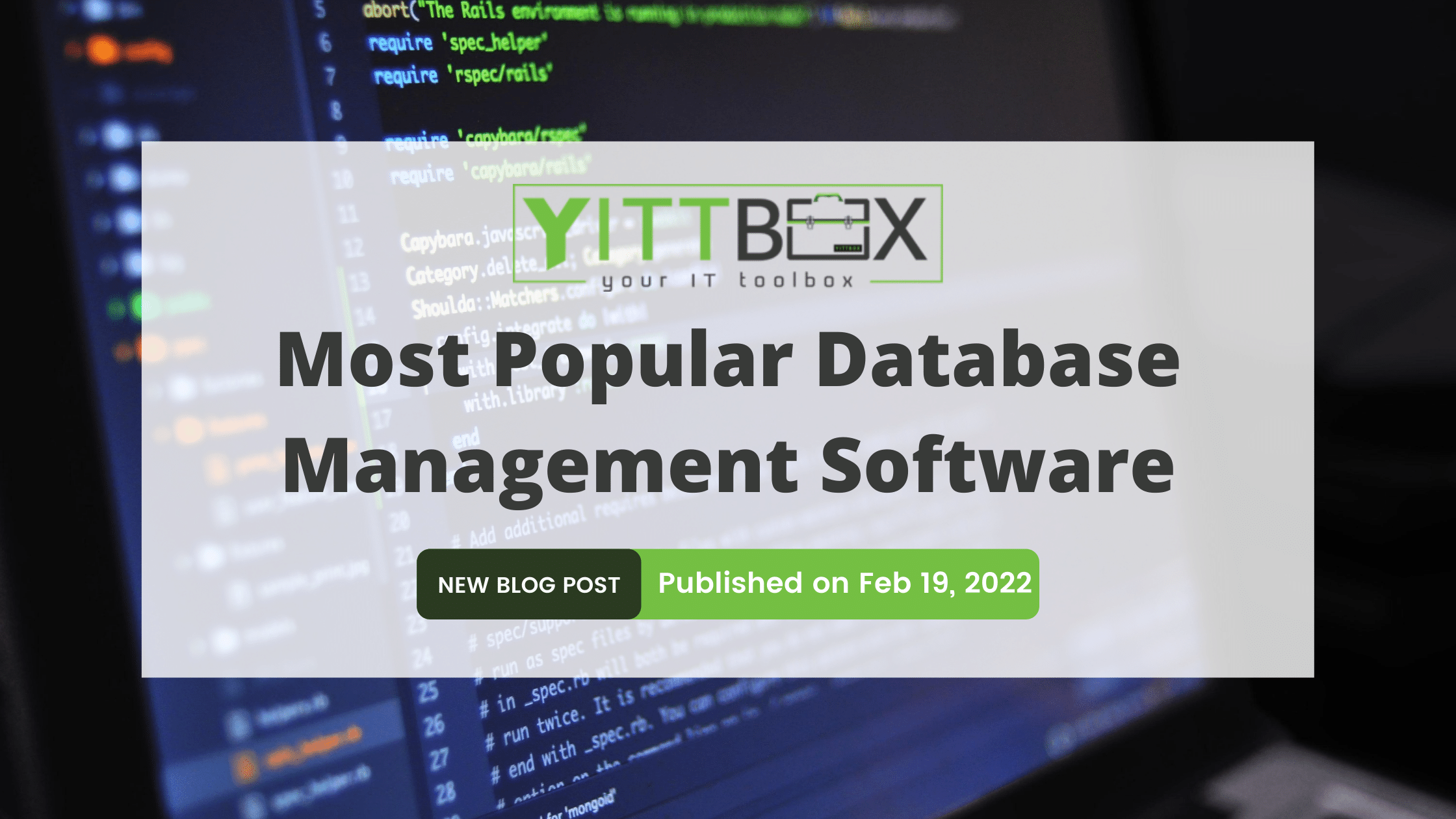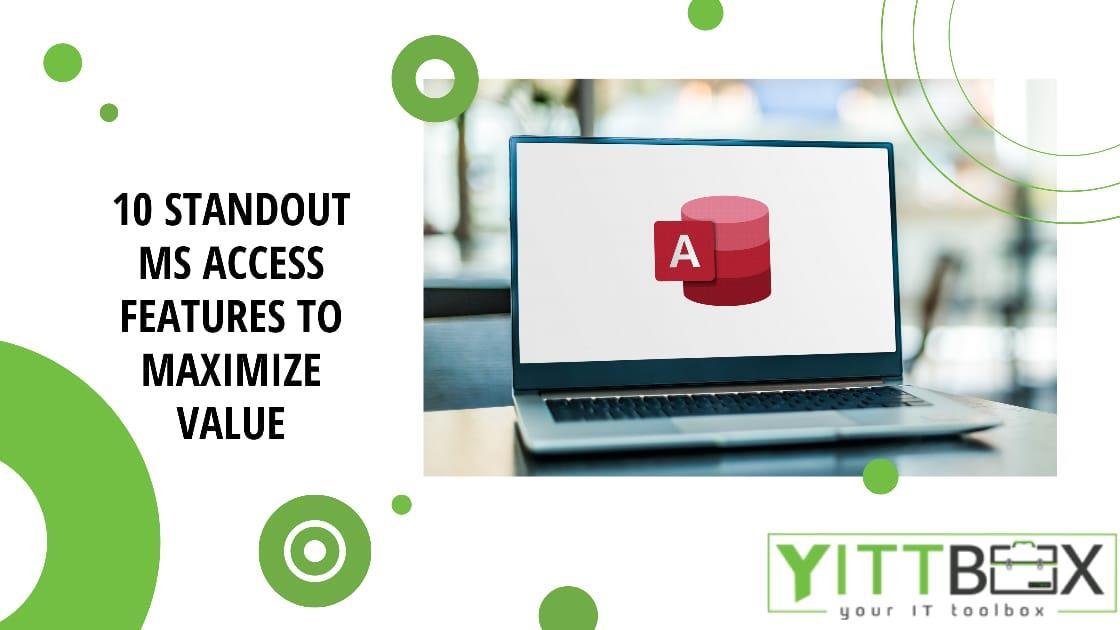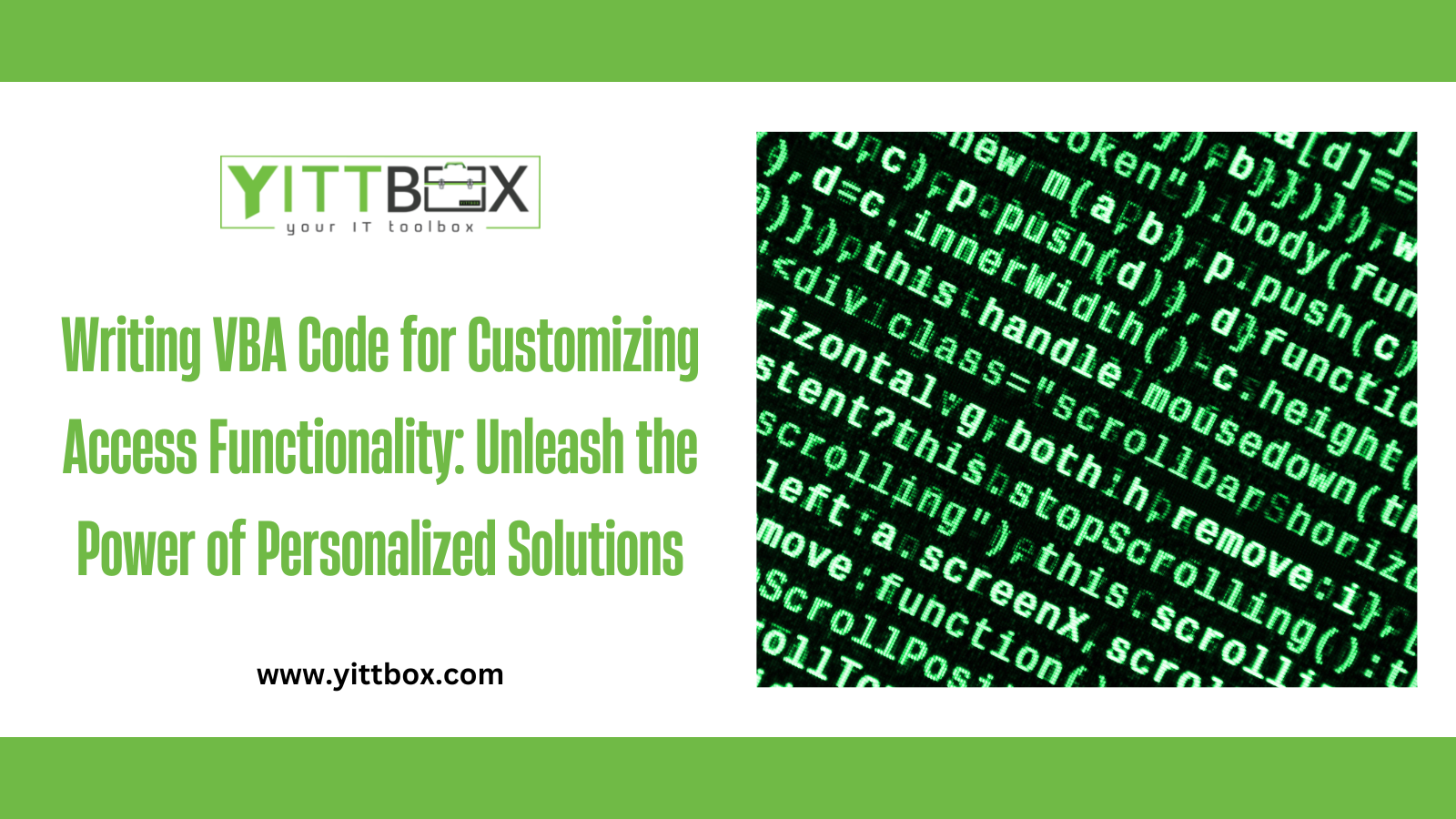Every business needs a database. It's stored through the site or on-site, managed locally or managed by a third party; companies require a reliable database that is searchable, flexible and able to manage the continuous flow of data. However, they don't manage, maintain, store and analyze this data independently. The correct database software (also known as a database management system (DBMS)) is essential to optimize performance and eliminate IT problems.
Most Popular Database Management Software: Intro & Concept
A database management system (DBMS) is a system-wide program that manages databases by creating and maintaining them. A DBMS lets users create, secure, read, modify and erase data from the databases. The most popular platform for managing data is the DBMS because it serves as an intermediary between databases and end-users or applications and ensures that the data is organized consistently and is easily accessible.
DBMS manages the data and database engine and the schema for the database, allowing data to be modified and extracted from users and other software. It provides data security, integrity, consistency, and standard methods of data administration. DBMS improves the organization of data using a schema design method called normalization. It divides large tables into smaller tables when one or more attributes have redundancy in the values.
DBMS has many advantages compared to conventional file systems, for example, flexibility and a more complicated backup system. The DBMS software can be classified based on various factors, including the model of data, distribution of databases, or user numbers. The most popular types of DBMS software are distributed, relational objects, hierarchical, object-oriented and network.
1. Oracle Database Management Software
The most recent release of the Oracle RDBMS tool encompasses larger databases, uses less space, and is more secure and efficient in processing data. In reality, it is among the best and most efficient object-relational DBMS tools.
It is possible to use Oracle RDBMS on a PC or a supercomputer with a powerful processor. Functional designs, for example, trigger a specific referential system in the software.
Pros:
- It is possible to create partitions so that you ensure better surveillance management over the data you store.
- A smooth transaction process, as well as secure data.
Cons:
- The price range of this tool discourages small-sized businesses.
- Client applications are usually connected automatically.
2. IBM DB2
The most recent version IBM DB2 runs queries faster than ever before. Additionally, the DBMS tool is now compatible with a majority of the languages used in data science to work with simple or complicated frameworks. Most importantly, people are drawn to the program due to its ease of installation and set-up to store a huge amount of data in a short time.
Pros:
- It has AI-specific capabilities designed to handle and organize complicated data
- It can be used for cloud as well as private environments.
Cons:
- The features offered by the DBMS tool might be too complex for a person who isn't a programmer.
3. Microsoft SQL Server
The Microsoft SQL Server is one of the most efficient database management software that exist. The "free" name of the program certainly draws a substantial audience. Its customized visual integration of the best databases can save users valuable time over the years. The diagrams created in this program are added to an existing project library.
The Object Explorer feature allows users to see the table's creation. Template Explorer, on the other hand, is a collection composed of scripts that can find a variety of names within databases. Additionally, the SQL Server creates specific containers which allow users to combine views and scripts from linked objects or groups.
Pros:
- It is easy to create the database server completely from scratch.
- Creates various tables, designs and displays data without syntax.
Cons:
- The lightweight software is not user-friendly in its interface.
- Needs a brand-new firewall security system.
4. MySQL
MySQL is an extremely fast data processing and productivity tool that comes with various features. It is designed to enhance the security and capacity of your database. An affordable and reliable tool assists with technical issues and helps to mitigate potential dangers. In addition, businesses with high volumes can use business-oriented and more complex MySQL applications.
Pros:
- The latest 8.0 version is more secure and has improved options for recovering data.
- It is easy to master the fundamental capabilities without programming experience.
Cons:
- Queries are stuck even after a restart or refresh.
- There is a lot of dependence on third-party add-ons.
- Data operations within Linux OS can get complicated.
5. Informix
Informix Dynamics Server is a commercial DBMS tool that's perfect for companies requiring a multithreaded and parallel information process. The software's capacity to scale is a major advantage, and it comes with a comprehensive assistance option.
Pros:
- Its Online Transparency Processing (OLTP) performance is superior to other systems.
- The ability to scale small systems to distributed multi-layered nodes.
- It is possible to combine relational data in the form of a time series.
Cons:
- The highest edition is costly for small-sized businesses.
6. Amazon RDS
Amazon RDS (Relational Database Service) is among the most effective DBMS tools. It is secured with a dedicated connection and automatically copies your data to an internal feature. Additionally, it can modify the size of your database's entire activities.
Pros:
- Users can process the heavy work in one database.
Cons:
- It is limited in auto-scale options.
- Requires access to the physical server to access the logs of servers.
- You must pay for the use of resources.
7. Teradata
Teradata is among the first DBMS tools. It has a top-quality processing speed for importing as well as exporting information. Along with the ability to process data in real-time, it can transfer massive databases in the blink of an eye. The data analytics provided by the DBMS tool has been proven to perform successful enterprise-level operations.
Pros:
- It has well-designed permissions controls to monitor or collect your personal information.
- Flexible storage of amalgamation using multi-variant formats for data.
Cons:
- The response time of third-party software can be slow.
8. SQLite
SQLite is specifically designed to serve small and medium-sized enterprises (SMEs). It’s simple layout and structure help users manage and store information easily. The SQL engine in the program is extremely efficient and reliable. It is self-contained. In actuality, the DBMS application is accessible on numerous mobile apps.
Pros:
- It takes less space and less time to set up.
- A reliable and compatible format for files that allow data to run across platforms.
Cons:
- The database data files stored in containers require time to get to another system.
9. Server Density:
This cloud-based online DBMS software allows users to manage and assess data performance through an easy-to-use graphic dashboard. Server Density helps businesses to discover problems early.
Pros
- Users do not have to be concerned about the remote execution of data.
- It is more visible to cloud service providers.
Cons
- The dashboard clusters may mislead users into rerouting information.
10. FileMaker
FileMaker is a great application with SQL connectivity and the ability to share information. The most appealing feature of FileMaker is the custom-designed templates that help users create data reports and invoices. It also allows for charts and graphs. This tool provides a professional and expert look to handle information.
Pros:
- Users can attend an in-person training course with trainers to get familiar with the software.
Cons:
- A small business might have difficulty using the features that can be scaled.
11. Microsoft Access
Microsoft Access is a database system that allows businesses and individuals to collect information, manage it and generate reports swiftly and efficiently. It's been included in Microsoft Office, which is part of the Microsoft Office suite of products and specific Microsoft 365 subscription packages.
Pros:
- It's extremely simple to use and install.
- It has a substantial memory capacity.
- Cost is an important benefit.
Cons:
- It is an indefinite data technology.
- All information is stored in one document.
- There could be security issues.
12. PostgreSQL
Open-source DBMS solution, it has gained notice because of its energizing option for indexing and configuration. PostgreSQL is the ideal solution if your everyday business tasks require the import or export of data.
At the moment, PostgreSQL can be used with Python in addition to JSON programming languages. While it is a relational database system, it is also free to build NoSQL databases. Additionally, the community of open-source developers has come up with a range of plug-ins designed to enhance the application's performance.
Pros:
- Management and storage of data in greater volumes.
- More secure data processing than other processes.
Cons:
- Native interface restricts the alteration of the data.
- Installation and configuring of software could take a long time.
13. Redis
Programmers might want to know that Redis is written in ANSI C language, which implies greater speed on all operating systems. In addition to this, the DBMS tool supports a range of types of data, including lists, hashes, and sets that can provide high-performance queries. The tool also has an internal memory data structure to index bitmaps, hyper logs, and streams.
Pros:
- The tool can be configured to replicate multiple databases.
- It allows for automatic partitioning of data.
Cons:
- The persistence of disk transactions at different levels could be difficult for non-developers.
14. CouchDB
CouchDB is among what is being referred to as NoSQL solutions. In particular, CouchDB is a document-oriented database, and within each document, the fields can be stored in key-value maps. Fields may be simply a key/value pair list, map, or list. NoSQL databases signify a move towards traditional databases.
They provide many advantages:
- Database replication is simple and easy over multiple servers.
- Rapid indexing and retrieval.
- The REST-like interface that allows document insertion, updates, retrieval, and removal.
15. Neo4j
A Neo4j database management system can manage and store various graphs within databases. Client applications can join the DBMS and allow sessions to open against it. Client sessions give access to all graphs in the DBMS.
Pros:
- Highly efficient writing and read scalability without compromise.
- High performance due to native graph storage and processing.
- It is easy to learn.
- User-friendly.
Cons:
- Limitations in terms of nodes or relationships and properties.
- It doesn't support sharding.
16. Altibase
Open-source DBMS tool offers the highest-quality data processing speeds. It also includes an in-memory database component that can store massive amounts of data on one disk. Altibase is one of the few combination DBMS tools that can offer huge scale-out sharding choices.
Pros:
- It's easier to access across a variety of industries.
- The unified engine supports memory-based storage and disk-resident database.
Cons:
- If you don't configure correctly, it could cause data operations to be slower.
17. Robo 3T
Robo 3T, previously called Robomongo, is among the most effective DBMS programs to handle a significant amount of work. It's stable with integrated features and is virtually 100% error-free. However, it is most popularly praised for its visually appealing drag-and-drop feature to construct queries.
Pros:
- Automating repetitive tasks is possible.
- IntelliShell lets users automate the completion of queries.
- Queries can be created and divided into every stage and segment.
Cons:
- Database migrations from SQL and MongoDB may result in problems.
18. Cloudera:
Large companies use Cloudera to process more data and for optimal security reasons. Cloudera also boasts an impressive performance efficiency and allows independent analytical tools to run. Furthermore, it includes machine learning algorithms that help comprehend and manage complicated data structures.
Pros:
- Users have the benefit of having a low risk of data locking-ins.
- Secure connections lead to higher productivity for businesses and lower costs.
Cons:
- It can be a hindrance to access to data for small-sized businesses.
19. HammerDB:
HammerDB is regarded as one of the few unaccredited benchmark databases used in conjunction with various languages and programs. It is a multi-threaded users’ engine that allows users to examine data controls. In addition, you can perform load tests based on queries and custom-made according to industry norms.
Pros:
- It provides users with instant access to their indexes to improve execution efficiency.
- It is possible to install the program as a stand-alone application or add third-party plug-in.
Cons:
- The sheer number of databases to work on your own can be exhausting.
20. CoScale:
The advantage of the strength of CoScale is monitoring and optimizing large-scale data projects. The main performance of the indicator window is shared among several users. Web developers, engineers, digital marketers, and operational managers can split the workload on CoScale.
Pros:
- It can track performance during technical nuances or business occasions.
- It can produce a comprehensive report on performance indicators.
- It is light, simple, and quick data optimization.
Cons:
- The server applications don't come with a separate alert system.
Most Popular Database Management Software: The Conclusion
In essence, we can conclude that all of the mentioned databases management systems offer advantages and disadvantages. Some may be beneficial, while others might not be the best for your specific needs. It is the day of data when an immense amount must be maintained, updated, and created daily. The need for Database Management Tools is growing rapidly, and the level of competition is also very high. Each tool endeavors to be better when it comes to functions to other tools. You can choose the DBMS according to your needs from the above selection.







